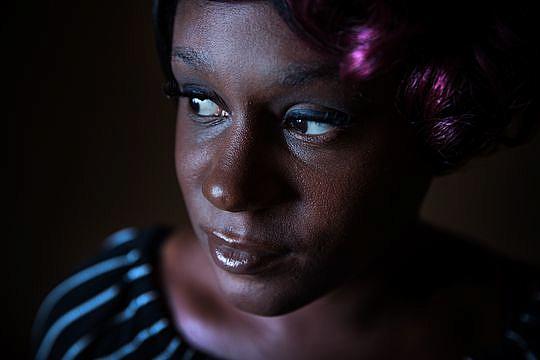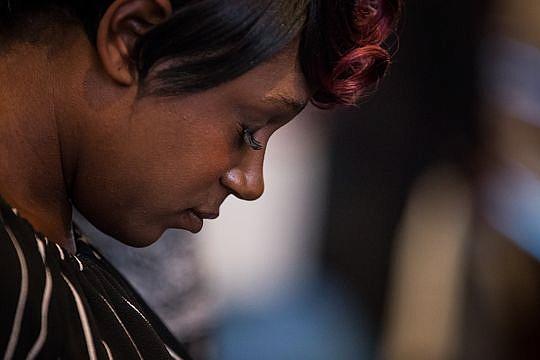Ashley Peterson: Why I decided to tell my story
This story was produced as part of a larger project led by Marisa Kwiatkowski, a participant in the 2017 National Fellowship.
Other stories in this series include:
Ashley’s foster home seemed perfect. It held a dark secret.
Becoming a pawn in the culture war, Ashley hides her abuse from the world
Ashley reveals her abuse and loses everyone she loves
Scarred and abandoned once again, Ashley’s rage takes control
Ashley finds the freedom to fall — and to discover her destiny

Ashley Peterson looks out of the single window in her motel room at Airway Motel in Atlanta, on Thursday, July 12, 2018.
Photo: Mykal McEldowney/IndyStar
by Ashley Peterson
I hope that I was able to share my story in a way that sheds more awareness, intellectually and emotionally, on the issues that all survivors of sexual abuse and assault face.
It took me over 15 years to finally get to a place where I was ready to heal. People love to say, "let it go,” or “get over it," without knowing the amount of time and work that it takes mentally and emotionally to honestly heal. But healing is personal. It is individual. No one can tell a victim when it is time, because healing is done within oneself.
This is the case not just for me but for all victims of abuse.
People understand how hard it is. This is why I've had many people tell me, "I’m so sorry that happened to you, I would never want something like that to happen to my child." I usually just nod, but inside I'm thinking, this is because they know that healing from abuse is a lifelong journey. They know abuse changes a person forever. They know a person will have certain struggles for the rest of their lives behind it. So, of course they wouldn’t want to have that become their kid’s life.
But, would they take that same concern for a child in this same situation, right now in this moment, or would they walk away in silence, because it isn’t their child?
Ashley Peterson prays during a church service at Berean Seventh-Day Adventist Church in Atlanta, on Saturday, July 14, 2018. (Photo: Mykal McEldowney/IndyStar)
Natural parents are usually the ones who find out about abuse first. Not because they are told, it’s because they care enough to pay attention to the warning signs, such as changes in behavior, words and thoughts. They know their child so they know when something is different, or when something has changed.
One thing is for sure, people that were around me continuously, such as child protective services, school officials and people from our church, had plenty of evidence that something wasn’t quite right. You see, at the time, of the abuse, I was antisocial, I was depressed, I walked with my head down, making no eye contact with anyone, unless they verbally asked me to. I was promiscuous, with boys at the church, and school. There were so many documented incidents. Yet no one looked deeply enough to see what was going on. No one stepped in to see if I was OK, even with such evidence. Everyone remained silent.
I was a child in foster care. Most of the adults around me treated me like I was unimportant. Why risk speaking up and breaking the silence on my behalf? Why risk causing a problem, and making too much noise? People acted like it wasn’t their business, and others simply didn’t care. It’s beyond important for me to express the fact that “Sssshhhhhhhhh,” the Silent Code, needs to be revoked. People shouldn’t feel put off or feel uncomfortable about speaking up for a child, who is voiceless and powerless when it comes to any kind of abuse. I had to speak up for myself, and I did, but many others could not.
This is the issue in many cases of child sexual abuse. Children want to tell someone. But, when they tell, who will believe them? Who will stand up for them?
For me it was completely overwhelming as a child, before and after I spoke up about the years of abuse I had gone through. Before I told, I had to handle keeping such a bad secret. I had to handle the mental and emotional control coming from my abuser’s wife, and the verbal and sexual control of my abuser. Warning me not to tell by glaring at me with stern dark eyes, and controlling all conversation and contact with anyone else, except for other children.
I told many times, before I found the perfect time to tell my foster mother. I first told some friends I played with in the neighborhood where we lived. Second, I told my best friend at school. The third time, I told my foster mother, when her sister came into town. I waited to tell my foster mother with someone else present, out of fear that she would do nothing without anyone else knowing. My foster parents were well liked in the community, and well respected before my abuse was made public, so I thought she would react with someone else present to save face. I was only 8 at the time. But, until I spoke up, I was the only person who was willing to protect me. I had no one else.
After I told, I had to deal with the aftermath.
What most people don’t understand is that, for victims, it is far worse to handle the emotions of other people surrounding their abuse, such as family, friends, teachers and care-providers. Not to mention the community and media. I was a child, so I didn’t understand everything going on, or the hatred people seemed to have for me, for speaking up about the abuse, I was going through. Members of my foster family made comments like, “this is so embarrassing for our family.” Asking questions like, "why did you make the abuse up?" As if to accuse me of lying, when my abuser was already in custody, so it couldn’t have been a lie. I was shamed for protecting myself. I was treated even more poorly from my foster mother, accusing me of ruining her life. She was the only mother that I had had since the age of three.
She shamed me. Too many people were not concerned about the child victim, and were instead concerned about their own reputations. This is the case for many children in the foster care system. Most abuse survivors do not even get the chance to tell, or be believed, so they go years, sometimes their whole lives, knowing things have happened to them. They become silenced. They become shamed. Not by choice, but because of the lack of evidence, and a lack of concern for their well-being when their abuse was going on.
People’s comments and shaming can add another unnecessary level of trauma to victims. So much so that they may turn away from healing, and addressing the abuse altogether.
Yet our healing journey can only begin when we are truly ready to open the wound of that pain, and to go back in the brain and remember the abuse. This is hard to do. It took me over a decade to get to a place where I was strong enough to do so.
It was important for me to heal for my own self peace. Professionals may wish for that to happen quickly. But no one can tell you when it’s time to heal. If a person isn’t ready, they are not ready. The healing needs to be initiated by the person who needs to heal.
I got tired of doing the same bad behaviors, and feeling the same bad feelings every day. I wanted to see myself in a new light. I wasn’t able to begin my journey alone. I needed support, someone to talk to, someone who would listen to my ramblings and memories.
My adoptive father was that support for me. We went back to the place I was abused, back to the places that triggered me the most. We did this to unlock memories that I suppressed. If we can’t remember what happened to us? How can we heal from it? Going back to these places was a tremendous jumpstart to my healing journey. My father was always ready to listen. I began to remember even more after leaving triggering locations. This was helpful to me because it cured me of a fear I had. A fear of going back to a place that caused me so much pain, to really step into it, and face it head on. The next step was to hold child protective services accountable for their negligence in not protecting me from an abusive situation and abuser.
Because I suffer from post-traumatic stress disorder and borderline personality disorder, Dialectical Behavior Therapy was the best option for me. DBT teaches self-awareness, mindfulness and rational thinking, all things that people with borderline personality disorder and PTSD struggle with. These disorders can be completely debilitating. They affect the thinking pattern and behavioral pattern without a person’s control. Years prior to doing DBT therapy, professionals were unsure of what therapy I really needed. I was misdiagnosed with ADHD and bipolar disorder, before being correctly diagnosed with borderline personality disorder. I was overmedicated with drugs that made me feel even worse. This is the case for many victims and survivors.
Disorders related to trauma are often misdiagnosed because mental health professionals may not be aware that abuse occurred, and the symptoms of trauma often mirror those of other disorders.
It is important for people who do not struggle from abuse to understand the challenges of those who do suffer from it, because there are so many who suffer, the majority still in silence.
The fear of speaking out has taken on a life of its own. It’s allowing horrible crimes to go unpunished, it’s allowing evidence to be impossible to find, so that when people get ready to heal, there is no legal documentation which we need to receive the proper service. It is giving all power and control to abusers and taking it further away from the victims. This is shaming the victim, shaming the victim with silence. This is why I know, there shouldn’t be any statute of limitations when it comes to sexual abuse. There is no limit on how long the effects last or on the lifelong disorders caused by abuse. Survivors deserve justice, no matter how long ago the abuse happened. Many predators know that if they touch a child that is too young to remember, they run less of a chance of getting caught.
We should not assist them in keeping secrets by turning away victims with the courage to remember and demand justice.
I ask everyone who reads this story, to not get caught up in the story, but to get caught up in the importance of speaking up for the voiceless. If you see, symptoms of abuse, ask the child or tell someone who can help. Don’t just sit back and say how awful it is, or turn it into neighborhood gossip. You could end up saving a child that will one day be an adult.
Thank you all for the opportunity to share.
[This story was originally published by IndyStar.]

